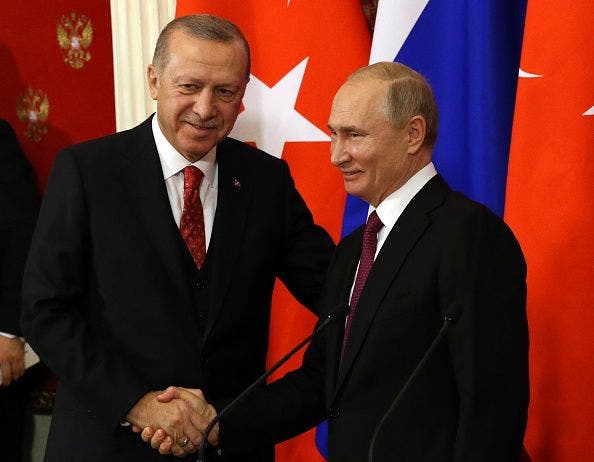Turkey’s ties to Russia scuttled its bid to buy advanced fight jets from the United States during President Trump’s first term in office.
But Trump has signaled he may reverse course now, despite increasingly tense relations between Moscow and Washington over Russia’s war in Ukraine.
The situation has put Trump in a difficult geopolitical bind ahead of his meeting Thursday at the White House with Turkish President Recep Tayyip Erdogan. The leaders are scheduled to meet in the Oval Office and then hold a bilateral lunch meeting after, according to the White House.
The first Trump administration decided not to sell F-35 jets to Turkey after the country bought an air-defense system from Russia, which sparked U.S. concerns that Moscow could obtain critical information about the advanced fighter jet program. Trump signaled last week that he may have changed his mind.
“We are working on many Trade and Military Deals with the President, including the large scale purchase of Boeing aircraft, a major F-16 Deal, and a continuation of the F-35 talks, which we expect to conclude positively,” Trump said in a social media post, referring to Erdogan.
Agreeing to sell F-35 fighter jets to Turkey, a NATO member, would be a significant victory for Erdogan. But it may invite criticism that Trump is not willing to stand up to Russia, just two days after he took a tougher stance against Moscow’s war in Ukraine.
On Tuesday, after meeting with Ukrainian President Volodymyr Zelensky on the sidelines of the United Nations General Assembly, Trump called Russia a “paper tiger” and said that Kyiv could recover all of its lost territory.

The comments were an about-face from Trump’s previous stance that Ukraine would have to give up some of the territory it lost to Russia during the war as part of any peace deal. Trump has drawn criticism since taking office for praising Russian President Vladimir Putin and refusing to place stricter sanctions on Moscow despite promises to do so.
How that calculus with Russia impacts the U.S.-Turkey relationship now remains to be seen. The war in Gaza may also play a factor this time around, due to tensions between Turkey and Israel, a close U.S. ally.
Trump’s decision over readmitting Turkey to the F-35 program is further complicated by Russia’s recent drone incursion into Poland, a NATO member.
Trump has called on NATO members to increase their defense spending to reduce America’s role in underwriting European security. Strengthening Turkey’s airforce could align with those goals, but it would likely increase tensions between Moscow and NATO members worried about Russian aggression elsewhere in Europe.
The personal relationship between Trump and Erdogan may also come into play as the U.S. considers Ankara’s request for the advanced fighter jets.
Trump and Erdogan developed a close relationship during Trump’s first term, and Trump has often used his personal connections to other world leaders to help guide his decision-making.
Whether or not Turkey scores a coveted F-35 agreement, the decision by Trump to host Erdogan at the White House is itself a victory of sorts for the Turkish leader. Erdogan was held at a distance by the Biden administration over concerns about Turkey’s relationship with Russia as well as Erdogan’s record on human rights.
In a Fox News interview ahead of his White House visit, the long-serving Turkish leader signaled that a meeting alone isn’t enough to cement his ties with Trump.
“I don’t think it’s very becoming of strategic partnership,” Erdogan said of the hold on F-35 sales, “and I don’t think it’s the right way to go.”
